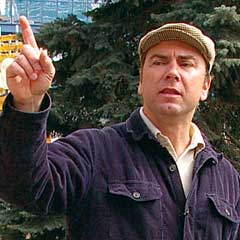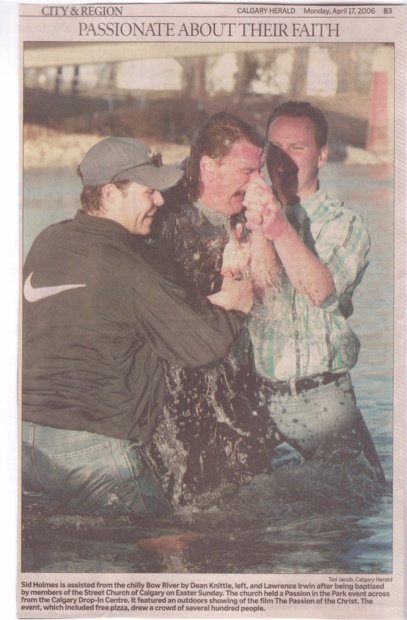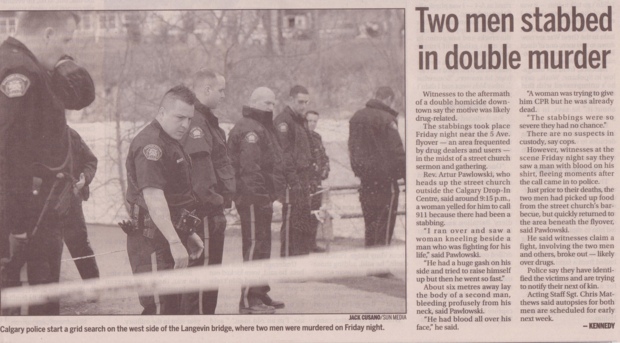Calgary bishop comes to defence of lay pastor
OTTAWA – Revenue Canada is “way out of line” and could be setting a worrisome precedent by revoking the charitable status of a church run by an activist lay pastor, said Calgary Bishop Fred Henry.
The Glory Christian Fellowship ran afoul of Revenue Canada due to the activities of its lay pastor, Artur Pawlowski. In December, the church received a letter from Dian Prodenov of Revenue Canada informing the fellowship its charitable status was revoked because “members of the Board of Directors espouse strong negative views about sensitive and controversial issues, which may also be viewed as political, such as abortion, homosexuality, divorce, etc.”
Revenue Canada had taken information off StreetChurch.ca, a web site for the entirely separate Street Church Ministries that Pawlowski, 37, also runs as part of his ministry to feed the poor and evangelize the homeless.Written by Deborah Gyapong, Canadian Catholic News,
“God bless him for what he’s doing,” said Henry. “Artur is out there on his own; he’s doing stuff that nobody else will do.”
The bishop called the letter an attempt “to muzzle somebody” and that Pawlowski was possibly being singled out because he represents a small organization.
“If they are successful in shutting him down, who’s next?”
Henry wondered if this move will silence and intimidate others from speaking out “on societal issues that Christians cannot accept.”
“I hope Artur gets some support on this. Clearly (Revenue Canada) seems to be way out of line.”
The bishop said Pawlowski’s case is bringing “some flashbacks” of a phone call he received in 2005 from a Revenue Canada official who threatened to revoke his charitable status for his robust defence of traditional marriage during the height of the same-sex marriage debate. Henry also faced two human rights complaints that were subsequently dropped.
Henry noted Pawlowski has also faced pressure from the City of Calgary. In 2007, the city tried to shut down his ministry that serves 150,000 people a year. City officials complained about the crowds he attracted, the barbecues he set up on the sidewalks, the stacks of food getting in the way of pedestrians or the amplified Bible-based preaching.
But in December, Alberta Judge A.A. Fradsham declared six of the bylaws unconstitutional and threw the case out. He said the city’s actions “fall precariously close to being excessive and, to any reasonable observer, an abuse of power.”
Henry said he found it odd that so soon after Pawlowski’s court victory he would hear from Revenue Canada. The bishop also noted the pastor’s outspoken efforts to get the city to treat Christians equally. Because the Calgary mayor had proclaimed a Gay Pride Month, Pawlowski told CCN he wanted the mayor to declare December Jesus’ month and to raise a flag for Jesus on Dec. 25. The mayor refused so Pawlowski filed a human rights complaint.
Pawlowski grew up in Communist Poland. He said when his younger brother got baptized, his father did not dare go inside the church because he feared someone might take his picture or report him to authorities and he would lose his government job. The street evangelist said he never thought he would face problems in his adopted country like those he left behind when his family fled Poland in 1990.
“It’s a constant battle with the government right now,” the married father of three said, adding that “crazy political correctness” was stripping Christians of their rights “in the name of equality.”
“(Pawlowski) preaches outside where others hear about it and complain about it,” said Calgary constitutional lawyer Gerry Chipeur, who specializes in religious freedom cases.
He ministers to the homeless, the drug addicted, the prostitutes and “puts himself right in the middle,” Chipeur said, noting that the pastor has been physically attacked by some of the dope dealers and pimps who don’t like his presence.
Chipeur said he is “shocked and appalled” by Revenue Canada’s violation of Pawlowski’s freedom of speech and freedom of religion.
“You cannot use your power under the Tax Act to achieve a religious objective,” Chipeur said. “You cannot use your power to shut down religious speech.”
Written by Deborah Gyapong, Canadian Catholic News,



